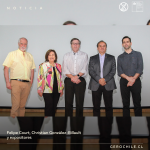The Huechuraba campus of Universidad Mayor hosted an international event focused on the current state and future challenges of geroscience and healthy aging.
The event was organized by the Geroscience, Mental Health, and Metabolism Center, GERO, formed by the Integrative Biology Center (CIB) of the University Mayor, the Faculty of Sciences of the University of Chile, and the Memory Clinic of the Hospital del Salvador. It featured Dr. Brian Kennedy, the current director of the Healthy Longevity Center at the National University of Singapore, who discussed the importance of taking a lifelong health approach.
“At the moment, we are focusing almost all efforts on the sick, but we pay very little attention to what we do for people while they are still healthy. That has to change if we want to catch up with the challenges caused by demographic changes in aging,” he said.
In this regard, he mentioned that his focus is on interventions and biomarkers, explaining, “Much of what we are working on in the laboratory, especially in preclinical studies, is how we combine different interventions to achieve an even greater effect and how we personalize it.”
The speaker also discussed the longevity revolution, considering aging as a modifiable process. “One perception that still exists in the world is that aging is not modifiable. It just happens, and there’s nothing you can do about it. I believe it will be easier to modify aging than to treat some of the diseases that occur as one ages, and that’s just a hypothesis,” he argued.
Tackling Aging
Dr. Felipe Sierra, current Chief Scientific Officer of Hevolution Foundation, elaborated on the term geroscience, which he coined years ago, emphasizing an approach that aims to tackle the aging process rather than emerging diseases.
During his talk, the scientist commented, “It’s very obvious that old age biologically comes with diseases too. You don’t go to the doctor unless you’re sick, and if you’re a man, you don’t go to the doctor even if you’re sick. What does the doctor look for? They look for symptoms, for example, if you have trouble recognizing your loved ones or if you forget things, they will probably think it’s Alzheimer’s.”
Dr. Sierra explained the relationship between genes and the environment, stating, “When both go wrong, then we talk about disease, and this correlation works well for young people. But when you’re old, genes are never going to change, and the environment can improve or worsen, but I can assure you that your health will deteriorate.”
“Genes and the environment determine what disease you will have. Aging, meanwhile, determines when you will have them,” he asserted.
Thus, the expert argued that if we “attack” aging, we will address all these diseases. But how can we do this when it’s a natural process? “It can be interfered with; that’s what geroscience is for. Treating only one disease at a time won’t help us as much; treating aging will help us treat all of them at the same time,” he emphasized.
Healthy Aging
Finally, Dr. Cecilia Albala, from INTA at the University of Chile, addressed the priority challenges for healthy aging in our country, considering the increasing age of the population and declining fertility rates.
“In this context, healthy aging becomes fundamental, extending active life. The health of older people is not measured by the number of diseases but by their functional capacity, their ability to navigate daily life, and that is given by the combination of the person’s intrinsic capacity interacting with the environment for adequate functionality,” she explained.
The specialist mentioned the need to reduce all kinds of inequalities. For example, healthy life expectancy is higher in men than in women in Chile, and individuals with high socioeconomic status live more years and more healthy years.
“That inequality is something we have to address with the utmost speed. We have to do something. Just because you’re poor doesn’t mean you should become disabled earlier; that’s unacceptable,” she said.
For the expert, the group of people over 80 years old increased more than three times between 2000 and 2017, posing a challenge for geriatrics and public health due to their higher risk of functional loss.
Other challenges include preventing chronic and degenerative diseases that are risk factors and functional limitations, treating chronic pain affecting quality of life and functionality, combating discrimination, increasing social participation of the elderly, having a healthy environment, and addressing the need for care, Dr. Albala pointed out.
Dr. Felipe Court, director of the GERO Center and the Integrative Biology Center UM, positively evaluated the event, highlighting the high attendance. “It was expected due to the quality of the speakers, who gave us an overview of what is happening in the world regarding aging,” he said.
Additionally, he emphasized the heterogeneity of attendees, including authorities, researchers, investors, and doctors, demonstrating the diverse interest in the field of longevity.





